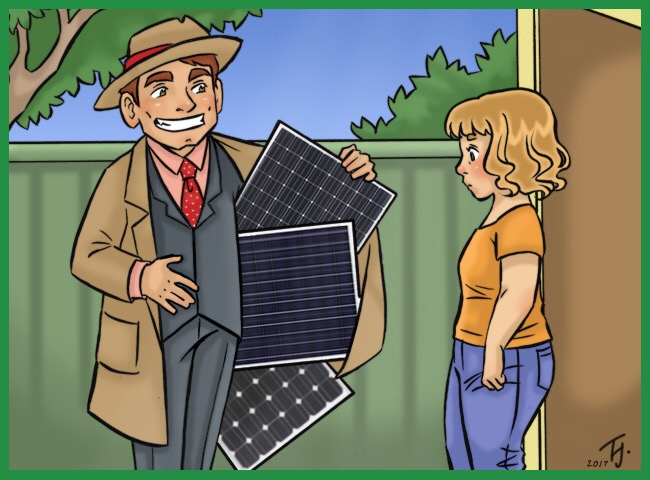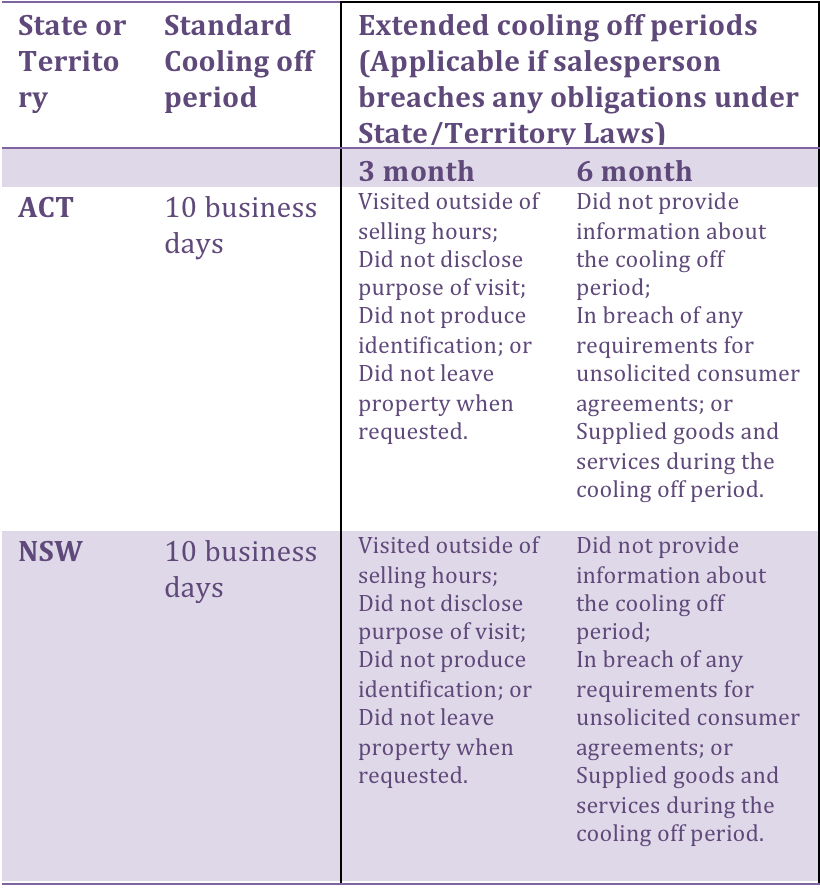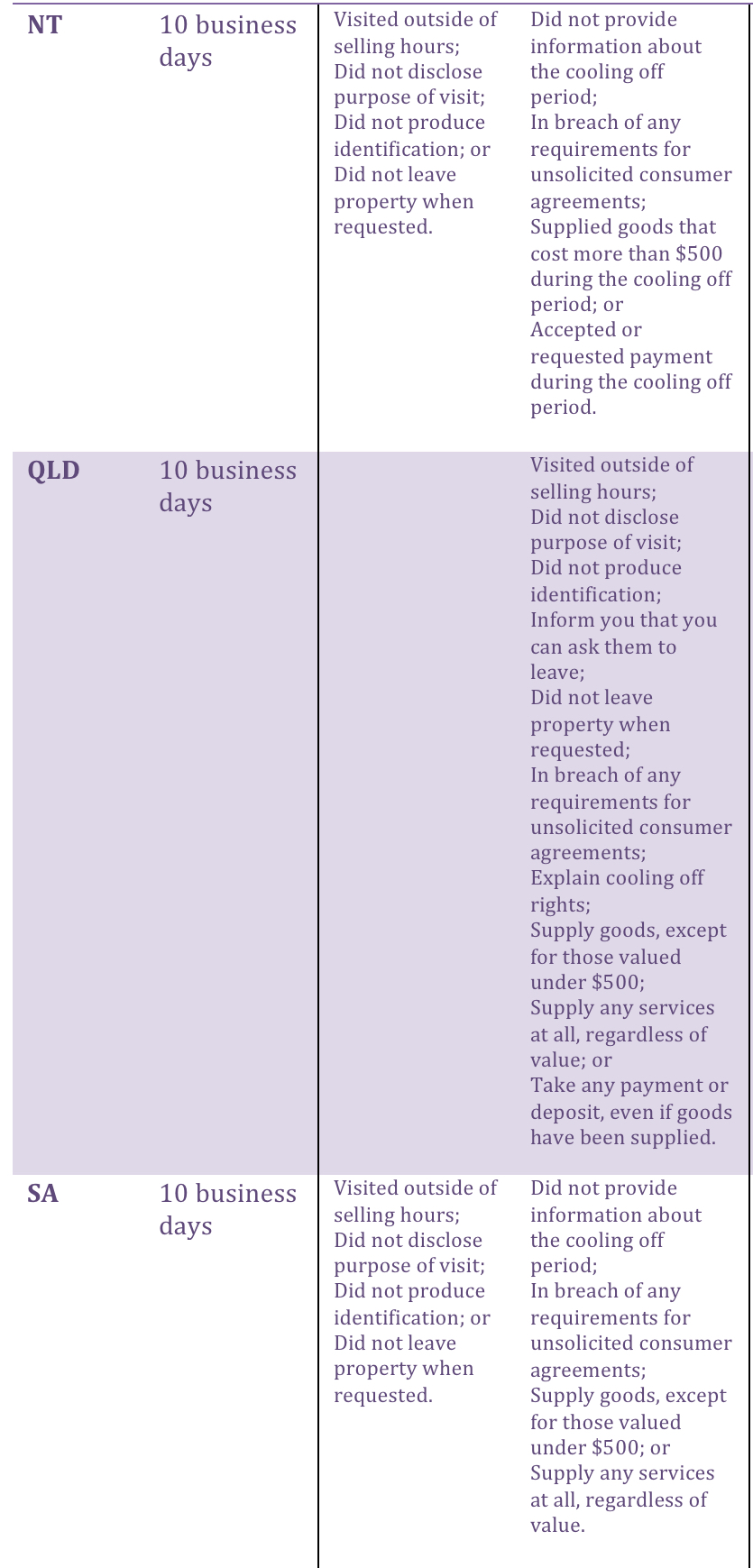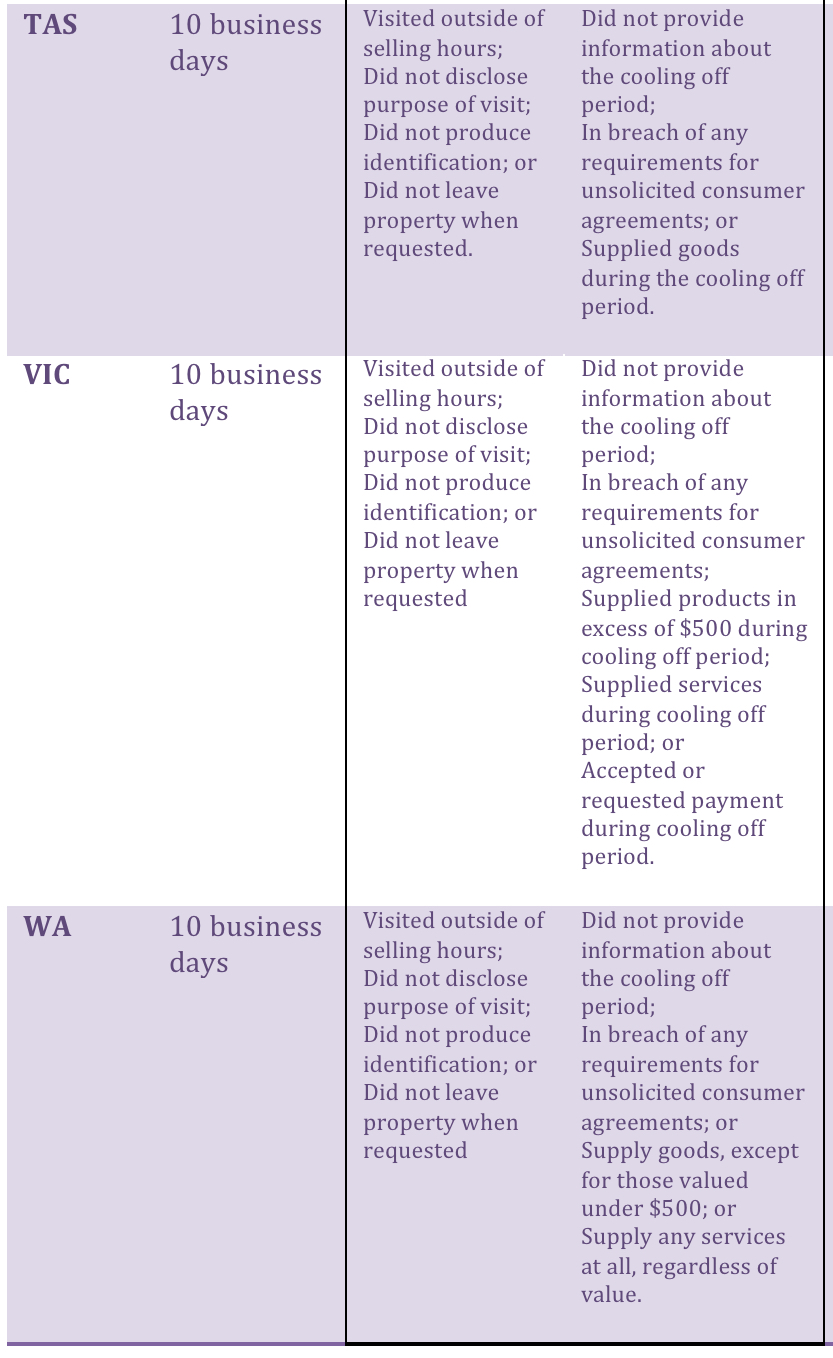
Door to door solar salespeople are common in Australia. Here’s what you need to know if you are approached.
If you own an unshaded roof in Australia, filling your roof with solar is probably the best investment you can make. That sounds like a smarmy sales pitch, but the numbers are there for everyone to see.
Yet over 75% of Australian roofs still don’t have panels.
So how can the solar industry get the message out to non-solar homeowners that they really need to at least run the numbers on getting panels installed?
One way is by writing about it on blogs like this one, then promoting that content far and wide. A small percentage of readers will decide to get quotes and invite an installer or three to either come to their home, or quote them over the phone.
In the industry that’s known as ‘pull prospecting’. A potential customer is ‘pulled’ in by content they see online and then decides to take the next step and get quotes.
The alternative is known as ‘push prospecting’. When a salesperson knocks on your door unexpectedly, and tries to ‘push’ you into buying solar, that’s ‘push prospecting’ at work.
Because most homeowners are at least considering solar, a persuasive salesperson who is selling solar can often have a lot of success simply walking the streets and knocking on doors of homes without solar. They come to your home uninvited and present information and deals that have been cleverly designed to sound hard to resist.
Not only are you under pressure from the surprise visit, but this deal is usually ‘only available right now’, and if you don’t already have solar panels on your roof the anxiety manifests as ‘fear of missing out’ as you begin to feel you might miss some great opportunity. These feelings set the cogs in your brain into overdrive thinking about all the money you’ve been promised you will save by installing some panels, and why on earth don’t you already have any – have you been hiding under a rock while everyone else is saving thousands on their bills?
If this happens to you, it is important to realise that this is all part of the selling strategy to bamboozle you to agree and sign up with them then and there without the benefit of other quotes to compare. Don’t be pressured in to signing anything.
Don’t get me wrong, solar panels are fantastic, and you should really consider installing them, just get quotes from reputable suppliers. I personally would avoid signing or agreeing to anything that a door-to-door salesperson has pitched to me, but let’s say I did. The contract/agreement would be an unsolicited consumer agreement or uninvited contract/agreement, as I have not asked for them to visit me and sell me something. Under the Australian Consumer Law, the unsolicited consumer agreement/contract must be accompanied by a cooling off period or notice that may terminate the agreement. Each State/Territory has the same 10 business day cooling off period. However, extended cooling off periods from 3 to 6 months can apply to violations made by the salesperson.
Let’s have a quick look at the rules door-to-door salespeople are expected to follow if they pay you an unsolicited visit:
- Visit within the hours of 9am-6pm weekdays, 9am-5pm Saturdays, and prohibited on Sundays and public holidays.
- Must be up front, and clearly explain the reason for their visit.
- Provide identification/ identify themselves.
- A salesperson must stipulate that upon request by you they are to leave your property, and leave immediately if you ask them to.
- A breach of one or all of the above can result in an extended cooling off period.
- If you are having doubts about a breach, check the table below for specific violations relevant to your State/Territory. The link will provide more detailed information about your rights.
Specific Cooling Off Laws By State / Territory


Unsolicited Agreement Links
If you have been bamboozled by a door to door salesperson, then here are the direct links for for your state or territory so you can see what your rights are:
ACT: Access Canberra
Unsolicited Agreements
NSW Fair Trading
Cooling off and termination requirements
NT Consumer Affairs
Door to door trading
QLD Office of Fair Trading Queensland
Rules Door to door salespeople must follow
SA Office of Consumer and Business Services (CBS)
Sales Practices
TAS Tasmanian Consumer Affairs & Fair Trading
Ininvited Agreements & Cooling Off
VIC Consumer Affairs Victoria (CAV)
Door to door sales
WA Consumer Protection –Department of Mines, Industry Regulations and Safety
Cooling Off
Note – unsolicited salespeople: If you ask the unsolicited door knocker for information or a quote and you at a later date contact that door-to-door salesperson to agree or sign a contract it no longer is an unsolicited or uninvited contract/agreement, as you are the one who has now made contact. Consequently, the cooling off period may no longer be applicable or a shorter time frame may apply, but check your State/Territory’s regulations.
Note – invited salespeople: Even if a salesperson comes to your home because you invited them these rules can still apply. For example, if you request quotes, and agree for company representatives to visit, unless you have agreed otherwise, you are inviting them to provide quotes, not to sell you a system there and then. So if you do sign up on the spot – then these cooling off periods, and other rules, also apply. If you sensibly take the quote to consider and compare it, accepting it at a later time, the rules above do not apply.
Always get more than one quote
Unless you know exactly what you want and how much it should cost, then buying from a random door knocker is a bad idea. Without comparing products, terms and conditions, and offers you could very well be buying a lemon. Ask for a copy of the specifications for you to peruse over at a later time, without them present. Use this information to obtain accurate comparisons to that particular product. Three quotes is a good idea. With unsolicited door knockers, you will most likely find there are better solar products out there at a better price, compared to their deal you have been so adeptly persuaded as being the bee’s knees.
If you are absolutely convinced that there are no better deals, then make sure you research the company who has come knocking on your door. Check the company registration at ASIC to see if they exist, read online product reviews and testimonies, check their licences, memberships, and is there any other information that can be found on the company which authenticates them?
BEFORE signing any contract/agreement check the following, including, but not limited to:
- Research the brand of panels, inverter, and battery storage; are they reputable? Shonky brands really do exist.
- If the panels have a German sounding name, where are the products actually made? A door knocker’s favourite trick is selling ‘German’ panels which are anything but German.
- Read the supplier’s policy on repairs. If they claim you have to bear any cost of claiming a warranty or have other tricky warranty caveats they may well be breaching Australian Consumer Law before they’ve even sold anything.
- Make sure you understand if you are purchasing or leasing the solar panels.
- Make sure they disclose any rebates included in the pricing.
- Read the terms and conditions of the offer.
- Read the warranties of the offer.
- Is there a ‘cooling off period’ notification included in the contract/ agreement, which clearly provides the organisation’s name and contact information (not a post office box number).
- How much is the deposit, and when is it required. No payments are to occur during the ‘cooling off period’.
- What is the total price payable, and how is this calculated.
- When is the installation date, and their policy if this date is not met. There are strict laws about supplying goods within the cooling off period, check your State/Territory’s specific laws.
- Ask the company to guide you on how best to reduce your energy consumption, which could possibly reduce the size of your solar system requirements. Otherwise, ask how best to change your energy consumption behaviour to get the best results from your system. A company willing, and able to do this would be a good indication to me of the virtues instilled in the company.
REMEMBER – If you have signed an agreement and feel as though you signed under pressure, are not happy with how the salesperson behaved, have doubts about the contract/agreement or simply changed your mind then check the above table, read the appropriate link or ring your State/Territory’s Consumer Protection Agency for advice. After all, these laws are in place to protect you from high-pressured selling strategies.
I do want to finish by saying how important it is to allow yourself time to process an offer provided by a door-to-door salesperson. You have the right to obtain other quotes, regardless of the protest by the salesperson. You also have an opportunity to terminate a contract/agreement if you have been unfortunate enough to have signed under coercion or a convincing sales pitch. If I have scared you into thinking you will say yes even if your brain says no to door-to-door sales then familiarise yourself with your rights pertaining to door-to-door salespeople before they come a-knockin’. If all else fails, download a printable ‘Do Not Knock’ sign place it in a prominent location, and the sign will say NO for you!


 RSS - Posts
RSS - Posts



what never seems to be explained or is common knowledge, once you do have solar power, the power company ups the kWh rate from say 30c to around 41c/kWh…. all companies seems to have a similar rise for those who have solar power.
Why is this so?
Just look up the relevant state government comparison website and swap to the offer that best suits your import/export profile and say good riddance to your current retailer.
Hello Glen
Electricity retailers are not supposed to discriminate against solar households. But, if they do, as Dennis Kavanagh suggests, find yourself a better retail plan. We have our own tool you can use to compare plans and find yourself a better deal:
https://www.solarquotes.com.au/energy/
Hi,
I like your article. Being involved in direct selling (door to door) for the past 26 years and only just started selling solar this way for the past 5 months i find it totally different and more time wasting than selling other products. Hence the reason i sell solar a totally different way outside of door to door now. Reason being is 3 main factors.
1. Trying to get the customers at home during the 9 to 6 pm hours
2. When you do get them at home the chances are they may be renting.
3. Trying to get both partners their at the same is also a difficult task so this then needs to be booked in for a more convenient time.
4. Cant get into properties due to being locked up or having dogs or no sales people signs,
Sure you can take the risk of still entering or target different areas or country areas trying to find a more retired location or home owner area but its still not all peaches & cream.
To be honest these so many different ways of getting to the clients without having to waste so much time walking the streets and banging on empty doors. i must admit solar has change the way for me when it comes to door knocking. There just isn’t any of this going on for me now. i find i get more deals in less time making it more productive.
Anyway thats my 2 cents worth.
Cheers
Ric
That’s all very well, but low income households need to have additional incentives to get the panels up in the first place. Not that I’m in that demographic, but knowing what the start-up costs are, they could be crippling for those watching every dollar already. It’s a kind of perverse outcome, that those who need cheaper power most, are those more unlikely to be able to afford the outlay. (And the advertised “specials” are never what they make out to be: there are always those little extras that seem to creep in when the quotes come in, such as roof pitch allowance, extra cabling, scaffolding for two-storey houses, etc etc). Also, landlords need incentives too (although adjustments to the capital cost base of rental properties for capital gains tax calculations in the future, and depreciation will work in their favour I guess), because those who rent (maybe 30% of Aussie households) are also excluded from the benefits of solar power, and again, many who rent won’t have the cash to outlay this themselves, nor should they. So, there’s more social analysis required by this industry and more lobbying of governments to provide equity across all households, if this truly is to be an energy revolution.
I had little money (ditto all the back-to-the-earthers I knew) back in 1981 when I installed my first panels, (Second hand 64watt ones, which cost me $13.80 per watt. But little by little added to them (along with help from dole payments) until I had NINE panels up!! I ran most of the house on car-parts from the wrecker (globes, switches, fuses, etc., and built a 92-amp generator by bolting a car alternator to a plank and attached it by belt to a (second-hand) 14hp Honda square-wave 2-stroke engine. (put out about as much power as my chainsaw!) which I used for the bigger short-term jobs –> microwave, washing-machine, power-tools, etc. Batteries I got for nothing at the tip:- up to 1500 ah ones from bulldozers, log-skids, jinkers, etc which were replaced by the logging industry every 12 months or so. One of them actually lasted me eight years (though most died after abut two years. (And I found half-a-dozen other uses for the batteries ~ want info. [email protected]
Point is that although everything changes over time there are ALWAYS better options for doing what you want to do….and they’re almost always cheaper…..along with other benefits like saving the earth.
NOTHING needs to follow benchmark set by commercial interests/products, let alone door-to-door salesmen. ie –> If a product or service is any good YOU’LL go looking for IT (or SHOULD do, especially these days of information technology)); nobody has to bring it to you.
ps, my hotch-potch of panels (mostly the common 45-watt ones, though had several of the biggest-available 64-watt ones up) are STILL working at a friend’s place up in the alps….but down to 80/85% of their rated capacity.
With door to door sales people, I do not remember having ever encountered them doing these;
”
Provide identification/ identify themselves.
A salesperson must stipulate that upon request by you they are to leave your property, and leave immediately if you ask them to.
”
Not initiated by them, anyway.
I am in WA.
With the content above;
“are they affiliated with the Clean Energy Council”
whilst it is mentioned in another article, elsewhere in the web site, I understand that relationship with the CEC, needs to be clearly explained.
My understanding regarding this, in simple terms, is that a “CEC Accredited Retailer” is subject to a code of conduct, and a “Member Of The CEC” is not.
I stand to be corrected, on that understanding, if I am wrong (“mone me si erro”).
Hi Bret
I went over the difference between CEC Approved Retailers and CEC Members here:
https://www.solarquotes.com.au/blog/cec-installers-retailers-members/
Becoming CEC approved is very difficult and indicates the business does high quality work and is very trustworthy, while the barrier to becoming a CEC Member is basically don’t be reprehensible.
The CEC will accredit individuals as installers or designers, but not businesses, so if a door knocker says they represent a CEC accredited retailer, watch out.
Short-circuit (!) all the above concerns, Kiddo. Go DIY stand-alone and get yourself an anti-social Dobermann! 🙂
Ronald – can you please clarify this?
Above, you said
”
I went over the difference between CEC Approved Retailers and CEC Members here:
https://www.solarquotes.com.au/blog/cec-installers-retailers-members/
Becoming CEC approved is very difficult and indicates the business does high quality work and is very trustworthy, while the barrier to becoming a CEC Member is basically don’t be reprehensible.
The CEC will accredit individuals as installers or designers, but not businesses, so if a door knocker says they represent a CEC accredited retailer, watch out.
”
And at
https://www.solarquotes.com.au/blog/cec-installers-retailers-members/
is
”
A CEC Approved Retailer Is A Clean Energy Council Approved Company
CEC approved solar retailer badge
A company can apply to become a CEC Approved Solar Retailer.
Companies that are willing and able to stick like glue to a strict code of conduct and pay the required fees can become a Clean Energy Council Approved Solar Retailer.
”
?
The CEC will give accreditation to individuals who train in solar installation or design and maintain their skills.
A company can’t train to be a solar installer or designer and so can’t become CEC accredited.
A solar installation company can be a CEC Approved Retailer. To become one it is necessary to:
Sign and follow the code of conduct.
Pay fees which will vary from around $800 to $6,000 a year, depending on the size of the company.
Do the paperwork required to show compliance with required procedures and policies.
Stay golden, stick to industry best practice, and don’t screw up.
A company can also become a CEC Member and this is much easier than becoming a CEC Approved Retailer.
(and welcome Mel!)
Just had a door knocker!
The chap’s ID said “Prism Group Pty Ltd”
He was trying to get me to agree to an appointment with “Neighbours Connect Solar”.
I asked if I could see his privacy policy. He looked confused.
He put me on the phone to Jacob from “Elite Marketing” who said I could not see their privacy policy, but promised me an 80% bill reduction.
If he’d looked hard enough he would have seen my 6kW solar, solar hot water and battery from the street.
The door-knocker then swiftly left and knocked on the door over the road which has a prominent ‘no sales people’ sign on it.
Oh dear.
It’s harder to overlook a Doberman……..particularly if it’s hanging off your crotch.
We signed with Integra Solar on 4-11-17 after a visit from a door to door salesman. We already had a few quotes but decided on their Black Max Solar panels. These panels were put on our roof 14-12-17, but we are yet to be connected. We’ve missed all of the summer solar benefit and still waiting to be contacted by Their installer regarding an instalment date. We received an invoice for payment in early January but were told to ignore it after I rang and told them the system has not been installed. Not impressed with the service to date. We removed their advert that entitled us to a “discount” on the price as we won’t be recommending their product to our friends or people in the neighbourhood. What options do we have now? I’d like to tell them to remove their panels and find another more reputable solar company.
‘……panels?? What panels?? (flog them to your off-grid father-in-law)
Hi, I was visited by a salesman, arranged through a phonecall for a quote. The visit was supposed to take 30-40 minutes. Over one and a half hours later He was still there despite me saying I needed him to finish up. That was late Thursday afternoon. On Monday afternoon at 5pm the installers arrived – I didn’t even get a chance to evaluate the quote within the cooling off period of 10 days. I wish I had never done it. The scheme is so expensive, the installer put the panels on a different side of the house. It is a disaster.
Do I have any recourse with the company?
Hello Kylie.
Yes, you do have recourse. If you contacted the company for the purpose of obtaining a quote then the 10 day cooling off period should apply. Also, if they did not leave after you requested them to they were likely in breach of state or territory laws. This article gives some details:
https://www.solarquotes.com.au/blog/door-door-solar-sales-know-rights/
I recommend keeping and photographing all documentation and immediately contacting consumer affairs or fair trading for your state or territory. They should be able to help you. The article above has a list of numbers that can be used.
Thank you so much. I will pursue it then. I have tried contacting the company and they are being evasive. I will keep going though. Appreciate your time and information.